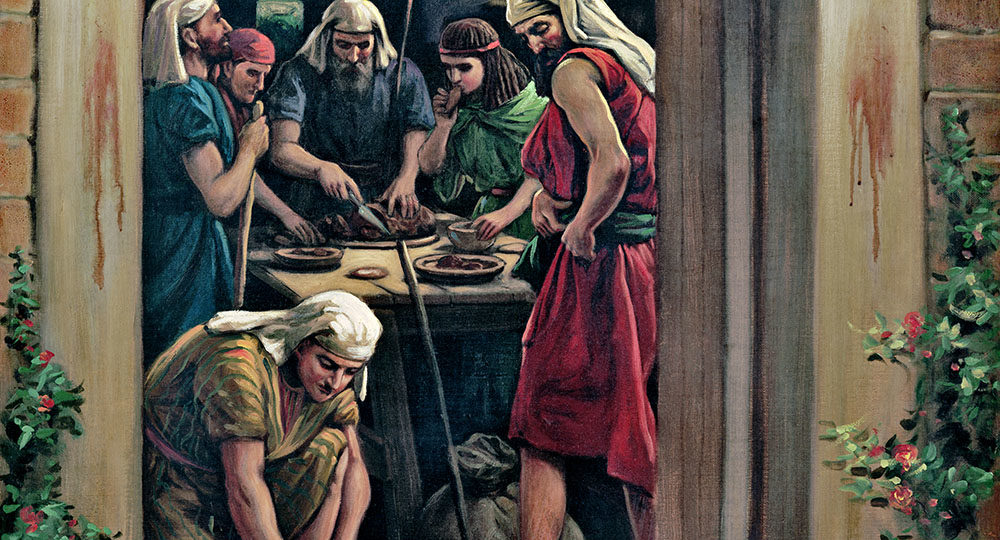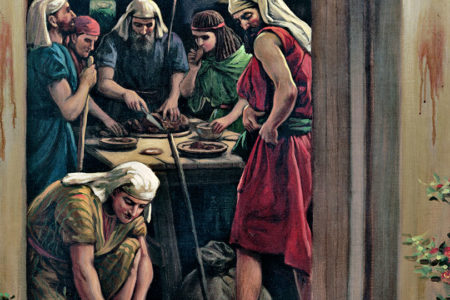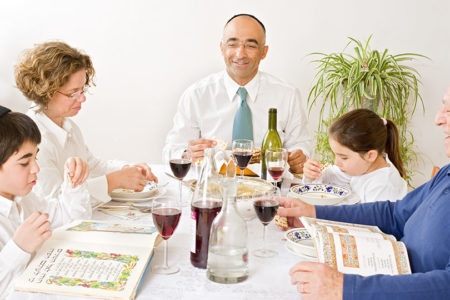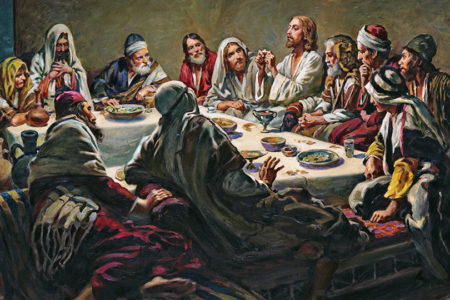How it All Began
Of all the Passovers that have ever been celebrated, only one was the actual Passover. It took place more than 34 centuries ago when the God of Abraham, Isaac, and Jacob was preparing to free His Chosen People from slavery in Egypt.
The Lord had sent Moses and his brother, Aaron, to Pharaoh to demand the Israelites be allowed to go into the desert to worship Him. Pharaoh refused. So God assaulted Egypt with nine devastating plagues. Yet Pharaoh still refused.
Then the Lord told Moses, “I will bring one more plague on Pharaoh and on Egypt. Afterward he will let you go from here. When he lets you go, he will surely drive you out of here altogether” (Ex. 11:1).
God, as always, did as He promised. The tenth plague is the key to the holiday of Passover because it involves the paschal lamb.
The tenth plague was the death of all firstborn males, both human and animal. And unlike the previous nine plagues—which never affected Goshen, where the Israelites lived—this plague would affect everyone.
The Lord also used the tenth plague to teach the Israelites the biblical principle of redemption through a substitute. He told Moses, “Consecrate to Me all the firstborn, whatever opens the womb among the children of Israel, both of man and beast; it is Mine” (13:2). If the Israelites failed to follow God’s instructions, these firstborn males would die, along with those of the Egyptians.
God told the Israelites to choose a young male lamb or goat (one per family) on the tenth day of the month of Nisan and observe their lambs for three days to ensure they were “without blemish” (12:5). Then, on “the fourteenth day of the same month…the whole assembly of the congregation of Israel shall kill it at twilight. And they shall take some of the blood and put it on the two doorposts and on the lintel of the houses where they eat it” (vv. 6–7).
The Lord also told them, “Eat the flesh on that night; roasted in fire, with unleavened bread and with bitter herbs….Do not eat it raw, nor boiled at all with water, but roasted in fire” (vv. 8–9).
God was not interested in their personal preferences on food preparation. The lambs were to be prepared His way only, and nothing of the animals was to remain. “What remains of [them] until morning you shall burn with fire” (v. 10).
That night, with the blood on their doorposts, the Jewish people sat in their homes and ate the Passover lamb. They were not to go outside. When God saw the blood, He protected them from the destroyer who passed through the land at midnight (12:29). Where there was no blood, the firstborn males in every household in Egypt, including Pharaoh’s, died.
The judgment gave victory to the God of Israel and exposed the impotence of Egypt’s idols and false deities.
The key elements of the original Passover were the roasted lamb, bitter herbs, and unleavened bread. Today’s seders are very different. The lamb is replaced by a shank bone of a lamb, called a zerah in Hebrew. The bitter herbs remain, as does the unleavened bread (matzoh). But other elements have been added, and the holiday has morphed from a somber time of dread into a joyous celebration of deliverance.
Passover’s main message, of course, is redemption. It is about God’s plan to redeem Israel from slavery. But it contains wonderful parallels to Christianity:
- The lamb was observed for three days to make sure it was perfect, without defect. Jesus was carefully observed during His three years of ministry on Earth and was pronounced not guilty by Roman prefect Pontius Pilate, who declared, “I find no fault in Him” (Jn. 19:6). John the Baptist, a Levite, said of Jesus, “Behold! The Lamb of God who takes away the sin of the world!” (1:29).
- Immediately following Passover is the seven-day feast of Unleavened Bread. In the Bible, leaven represents sin. So for these seven days, observant Jewish people abstain from eating all products containing a leavening agent, such as yeast. Scripture teaches that Jesus, the God-Man, was perfect—without defect, without sin—making Him the perfect sacrifice for a holy and righteous God.
- Finally, there is the holiday of Firstfruits (Lev. 23:9–14). According to the Bible, it was to be observed “on the day after the Sabbath” (v. 11). Though there is some disagreement concerning what that instruction means, Firstfruits nevertheless clearly falls during Passover. In Christianity, it is associated with the resurrection of Christ. As the apostle Paul wrote,
But now Christ is risen from the dead, and has become the firstfruits of those who have fallen asleep. For since by man came death, by Man also came the resurrection of the dead. For as in Adam all die, even so in Christ all shall be made alive (1 Cor. 15:20–22).
Though Passover today differs substantially from the original observance, it still points clearly to God’s profound love for Israel and His physical deliverance of the Jewish people. It also is a beautiful picture of His love for all mankind through His provision of Jesus, the ultimate Passover Lamb, whose death and resurrection provide spiritual deliverance from the bondage of sin to all who put their faith in Him.








Thank you for this explanation. .. I would need more knowledge about the true meaning of Passover for today celebrations differ from what the Bible tells about the meaning of since the Original Passover